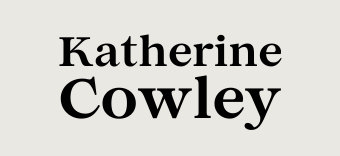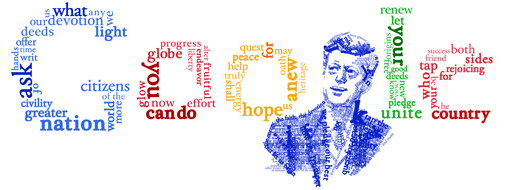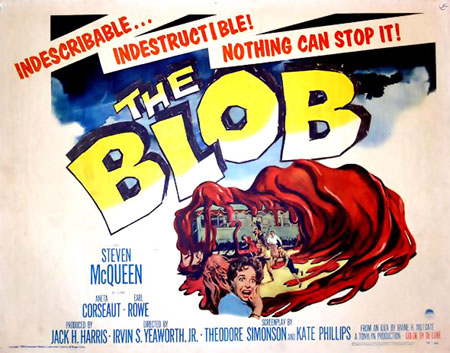The Steady Spread of the Deadly Atom: JFK’s Inaugural Address in the context of the Cold War
“The steady spread of the deadly atom” was a term coined by John F. Kennedy in his inaugural address. It evokes the fear of the Cold War, and the uncontrollable elements of the atomic weapons that we (and our Soviet neighbors) theoretically controlled.
Unluckily, “the steady spread of the deadly atom” was not a phrase I had ever heard before today. Because I admit, prior to seeing today’s Google’s Event Logo, I had never read or viewed JFK’s inaugural address, delivered 50 years ago, on January 20, 1961.
Like most Americans, my education about his address consisted of 3 or 4 quotable lines, most notably, “Ask not what your country can do for you; ask what you can do for your country.” Memorable? Yes. Timeless? Yes. Overused? Most certainly.
Contrast that phrase, which somehow manages to simultaneously be both trite and inspiring, with the following sentence from the speech, which reveals a rational voice piercing through the terror of the times:
But neither can two great and powerful groups of nations take comfort from our present course — both sides overburdened by the cost of modern weapons, both rightly alarmed by the steady spread of the deadly atom, yet both racing to alter that uncertain balance of terror that stays the hand of mankind’s final war.
No longer is it simply atomic weapons that frighten us. The apocalyptic imagery of “mankind’s final war” is brought about by “the deadly atom,” a presumably small force that somehow wields parasitic, deathly power. An ordinary atom–like the atoms in you and me, in our schools and in our homes–is elevated to being deadly, to being a nuclear force. This language implies that the threat is among us. It is everywhere. And it may just very well destroy us.
This parasitic, destructive imagery is reminiscent of the pop culture of the 1950s. Take the 1958 genre film The Blob as an example. Some sort of tiny red thing (or, for lack of a better word, blob) lands in a small town in a missile-like container. Are aliens responsible? Or the Soviets? We never find out. This blob slowly starts taking over the town, eating pets and then people, growing at an unstoppable rate.
Yet while The Blob can be rather laughable (though it’s well worth watching), the deadly atom of JFK’s speech is anything but funny. It weightiness is more along the lines of the inevitably dark 1955 film noir Kiss Me Deadly, in which a mysterious Pandora’s box (that inevitably must be opened) contains a deadly atomic force strong enough to destroy the world.
Today the phrase “the deadly atom” does not seem to have the same weight. After all, we do not live in the shadow of a Cold War. Yet the risk of our weapons, the power of our everyday tools to destroy, is much the same today as it was in 1961. So perhaps we should follow the invitation John F. Kennedy gave directly following his description of atomic fears:
So let us begin anew — remembering on both sides that civility is not a sign of weakness, and sincerity is always subject to proof. Let us never negotiate out of fear, but let us never fear to negotiate.
Let both sides explore what problems unite us instead of belaboring those problems which divide us.
Let both sides explore what problems unite us instead of belaboring those problems which divide us.
In the face of deathly physical force, language may be the only solution.







